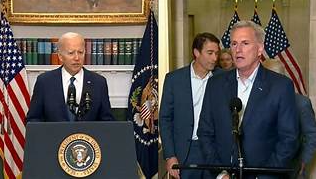The House passed a key debt ceiling bill that now moves to the Senate ahead of a looming default deadline.
On Wednesday night, the House passed a critical debt ceiling bill by a vote of 314-117, just days before the June 5 deadline to prevent a catastrophic U.S. default. The bill, a product of negotiations between Speaker Kevin McCarthy and President Joe Biden, suspends the debt ceiling for two years and includes some modest spending cuts and policy changes. This deal aims to prevent an economic crisis by allowing the U.S. government to continue borrowing without facing an immediate shutdown.
The vote was a major test for McCarthy, whose leadership has been challenged by hard-line Republicans who opposed the bill for not doing enough to reduce government spending. Despite these challenges, the bill passed with strong bipartisan support, clearing a key procedural vote earlier in the day. McCarthy has been facing internal pressure from far-right members who pushed for more aggressive cuts.
Now that it has passed the House, the bill heads to the Senate, where it faces further scrutiny. The Senate must act quickly to ensure it reaches President Biden’s desk before the looming default deadline. If approved, the bill will suspend the debt ceiling until after the 2024 presidential election, offering temporary relief to the nation’s finances.
During a post-vote news conference, McCarthy indicated he would continue to push for additional spending cuts and work requirements, which were included in the bill but not as aggressively as some Republicans had hoped. He praised the bill’s passage, claiming it was a win for fiscal responsibility and signaling that further negotiations on cuts would follow.
McCarthy’s comments suggested he was emboldened by the bipartisan support for the deal and was prepared to leverage this momentum to push for additional concessions. His remarks were aimed at ensuring his position as Speaker remains secure while pushing for more stringent fiscal reforms in the future. The outcome of the Senate vote will be crucial in determining whether the deal ultimately becomes law.

